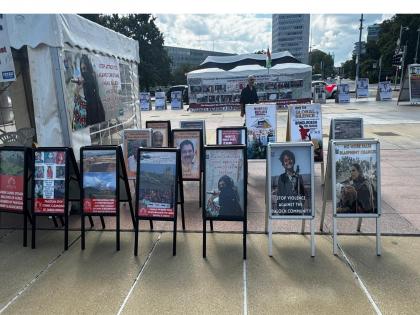Geneva: Broken chair protest calls out Pakistan, Bangladesh for systematic abuse of minorities
By ANI | Updated: September 11, 2025 19:00 IST2025-09-11T18:58:56+5:302025-09-11T19:00:10+5:30
Geneva [Switzerland] September 11 : A striking three-day protest exhibition organised by the Global Human Rights Defence (GHRD) ...

Geneva: Broken chair protest calls out Pakistan, Bangladesh for systematic abuse of minorities
Geneva [Switzerland] September 11 : A striking three-day protest exhibition organised by the Global Human Rights Defence (GHRD) at the Broken Chair monument in Geneva has drawn attention to the oppression of religious minorities in South Asia, especially in Pakistan and Bangladesh.
The event, timed with the ongoing session of the United Nations Human Rights Council (UNHRC), aimed to raise awareness of systematic abuses targeting vulnerable communities.
The exhibition displayed powerful visuals, posters, and testimonies depicting the persecution of Hindus, Christians, Sikhs, and other minority groups.
It highlighted the abduction and forced conversion of girls in Sindh, attacks on places of worship, murders of Hindus and Christians in Bangladesh, terrorist violence in Kashmir, and the anguish of Baloch families searching for missing relatives. Organisers accused global institutions of turning a blind eye, claiming their silence enables continued persecution and discrimination.
"This violence is not random but a deliberate attempt to erase communities and criminalise their faith," GHRD representatives stated, calling for greater international accountability. They urged the UN to take concrete action by holding Pakistan and Bangladesh responsible for violations, conditioning aid on minority protection, and ensuring stronger monitoring of human rights abuses.
Speakers also criticised the misuse of blasphemy laws and other oppressive legislation that have been weaponised against minority populations, leading to extrajudicial killings, unlawful detentions, and forced displacements. Activists stated that international inaction amounts to betrayal, with slogans like "Silence is Complicity" displayed prominently at the protest.
Civil society leaders praised the initiative as a crucial platform for amplifying the voices of those silenced by fear and oppression. They urged NGOs, rights organisations, and international bodies to step up efforts during UNHRC sessions and beyond to protect vulnerable communities.
Abduction, forcible conversion to Islam and marriage of Hindu girls, mostly minors, to Muslims continue unabated in various areas of Pakistan, particularly in Sindh, without invoking any concern and attention of the administration, human rights organisations, mainstream media and social media platforms in Pakistan.
Amid the persecution of minorities, rights experts have said Pakistan's legal system needs urgent reform to protect the safety and dignity of the minorities, including the Ahmadi community. Notably, the Ahmadi community in Pakistan lives as second-class citizens. The anti-Ahmadi Muslim sentiment is powerful in Pakistan. It is one of the most persecuted minority communities in the country.
Disclaimer: This post has been auto-published from an agency feed without any modifications to the text and has not been reviewed by an editor
Open in app